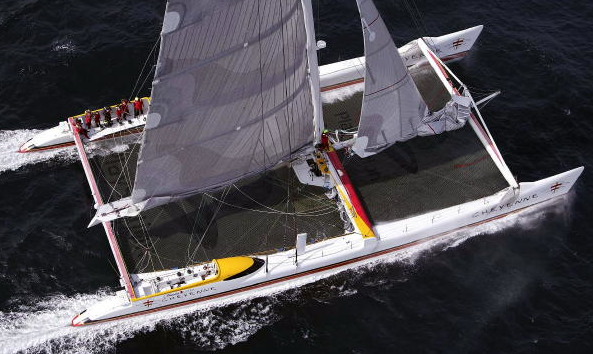How the only US winner of the round the world record was written out of French sporting history
Reading the French newspapers over the weekend, you would never think that the record for the fastest yacht to sail non-stop round the world had once gone to a US yacht and skipper.
American adventurer Steve Fossett has effectively been written out of history.
Indeed the outright record Fossett and his crew set in 2004 in the maxi catamaran Cheyenne (still better remembered as PlayStation) has not been mentioned in France. It has been supplanted by Frenchman Olivier de Kersauson’s circumnavigation in the trimaran Géronimo the same year – even though de Kersauson was more than five days slower.
It’s as if Cheyenne’s time never existed and the reason behind it is a particularly petty piece of sailing politics. Well, OK, not just politics. As the saying goes, follow the money.
To explain, the round the world non-stop record is a beast with two heads. There is the officially certified time, and then there is the trophy.
The French media have been concentrating on the trophy – which is exactly how it was originally intended to be.
Outright sailing records are monitored and ratified by the World Speed Sailing Record Council (WSSRC). To be eligible you pay an administration fee to cover scrutineers’ time.
The prize, on the other hand, is the Jules Verne Trophy, a clever media concept dreamt up some 20 years ago by a group including top French sailors Florence Arthaud, Olivier de Kersauson and Titouan Lamazou.
You had to pay to be eligible for that club as well. And back in 2004, Fossett objected to the sum asked.
According to Fossett, the Jules Verne Trophy organisation had got greedy.
“It was botched up when Ellen MacArthur came on the scene with big sponsorship money,” Fossett told me at the time.
“The Jules Verne Trophy organisation set a new high fee to take advantage of this and they asked me to pay €30,000, whereas my competitors, Olivier de Kersauson and Bruno Peyron were only paying €11,000.
“I thought that was inequitable and I offered to pay the same as my competitors.”
They refused to take the same amount, and I believe Fossett was also asked to pay upfront, whereas the others only needed to pay if they won the trophy. The rest is history…or, in the late Fossett’s and Cheyenne’s case, not history.
And so the Jules Verne Trophy became bizarrely flawed.
Cheyenne’s crew, which smashed the world record by a breathtaking 13 days – the largest margin in modern history – didn’t receive the prize, yet the same winter it was presented to Géronimo after failing to get anywhere near the record.




